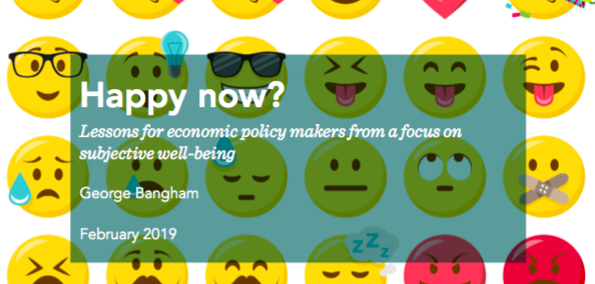Elliot Jones ’18 (Macroeconomic Policy and Financial Markets) is a Sovereign Credit Risk Analyst at the Bank of England. Together with co-creator Jessica Golding, he has established Exploring Happiness, a research organization that looks to bring produce evidence-based research in order to generate policy recommendations focused towards sustainably increasing wellbeing across all areas of society.
The latest project to come out of the initiative is the Exploring Happiness Index. This is an online tool that anyone can use to help them achieve their goals and to support their mental health.
Learn more about the index in the video and read on to find out how to start using it:
Explaining the concept of the index
Everyone is different and what makes each of us happy is also different. Some people are career-driven, others live for the social scene and some are highly family-orientated. Despite this, we all also have a lot in common – we all value our health, both mental and physical, the quality of our personal relationships matters a lot and we all like to have something to do that makes us feel worthwhile. It is these basic fundamentals that we use to build our index. We take evidence-based research on the main determinants of life satisfaction (which is taken as being synonymous with happiness) to bring together a group of components that we all have in common and these become the building blocks of the index.
Methodology
The differences of users are captured in two main ways – by identifying the circumstances and preferences of each user. When creating an account each user can choose from 13 different individual types such as an employed worker, a student or a retired person. As a result of this choice, the components that make up the index will change to reflect that individual types circumstances (e.g. an employed worker has a ‘Work’ component, a student has an ‘Education’ component and a retired person has neither of these, but greater weight is applied to their ‘Leisure Time’ component).
Next, users are then able to choose how important each of the components are to them and the weights in the index will shift to reflect these choices. These two steps make the index unique for each user.
Three benefits of using the index
- Being informed: Our decisions, big or small, will play an important role in determining our happiness and we are more likely to make the right decision when we have better information available to draw upon. The usage of this index provides users with this information, perhaps meaning just knowing how happy you are could make you happier.
- Mental health tool: Using this index allows users time to reflect, to think about what has been going well and what has been more challenging. There is good evidence available which points to the benefits of self-reflection on mental health. This has been shown for self-reflection in a number of forms (e.g. from expressive writing to gratitude journaling), across various life stages and as an effective treatment for those with diagnosed mental illnesses. Our view, which we intend to robustly test in the future, is that the method of self-reflection that this index requires will boost users resilience and mental wellbeing.
- The ultimate tracker: Nowadays, it is not uncommon to track several parts of our lives, from steps to sleep to calories. But what’s the point in tracking these things? For most people, it’s because they believe if they do more steps or sleep better, they will end up feeling better. This index allows you to check whether that’s true in practice.
Get starting with the Exploring Happiness Index
You can create an account here or find out a little more first by heading to the index homepage.
If you have any feedback, please email info@exploringhappiness.co.uk or use the feedback form on our website.

Elliot Jones ’18 is a Sovereign Credit Risk Analyst at the Bank of England. He is an alum of the Barcelona GSE’s Master’s in Macroeconomic Policy and Financial Markets.






